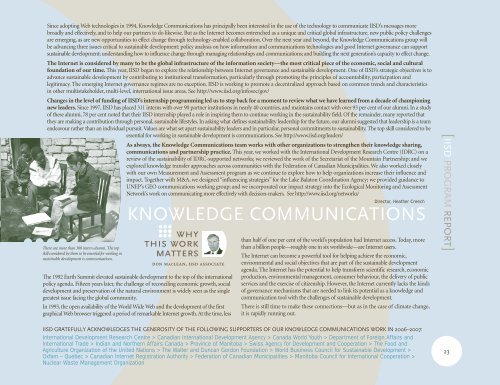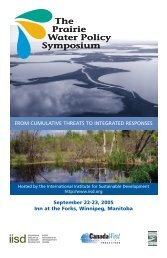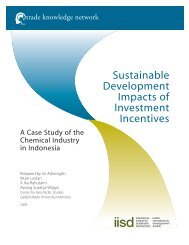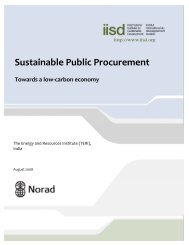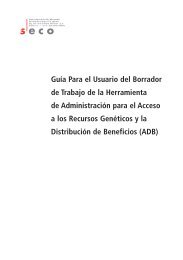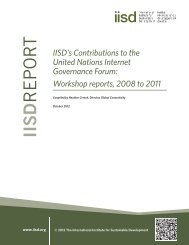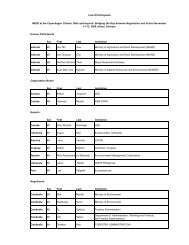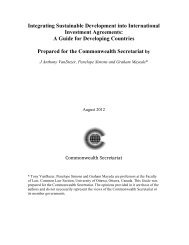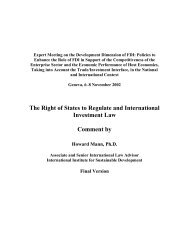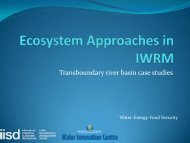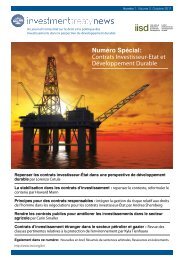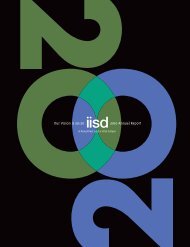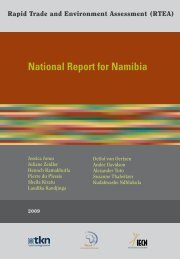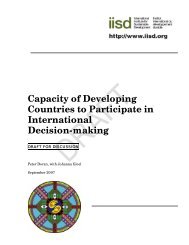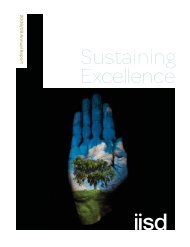2006/2007 Annual Report - International Institute for Sustainable ...
2006/2007 Annual Report - International Institute for Sustainable ...
2006/2007 Annual Report - International Institute for Sustainable ...
You also want an ePaper? Increase the reach of your titles
YUMPU automatically turns print PDFs into web optimized ePapers that Google loves.
Since adopting Web technologies in 1994, Knowledge Communications has principally been interested in the use of the technology to communicate IISD’s messages more<br />
broadly and effectively, and to help our partners to do likewise. But as the Internet becomes entrenched as a unique and critical global infrastructure, new public policy challenges<br />
are emerging, as are new opportunities to effect change through technology-enabled collaboration. Over the next year and beyond, the Knowledge Communications group will<br />
be advancing three issues critical to sustainable development: policy analysis on how in<strong>for</strong>mation and communications technologies and good Internet governance can support<br />
sustainable development; understanding how to influence change through managing relationships and communications; and building the next generation’s capacity to effect change.<br />
The Internet is considered by many to be the global infrastructure of the in<strong>for</strong>mation society—the most critical piece of the economic, social and cultural<br />
foundation of our time. This year, IISD began to explore the relationship between Internet governance and sustainable development. One of IISD’s strategic objectives is to<br />
advance sustainable development by contributing to institutional trans<strong>for</strong>mation, particularly through promoting the principles of accountability, participation and<br />
legitimacy. The emerging Internet governance regimes are no exception. IISD is working to promote a decentralized approach based on common trends and characteristics<br />
in other multistakeholder, multi-level, international issue areas. See http://www.iisd.org/infosoc/gov/<br />
Changes in the level of funding of IISD’s internship programming led us to step back <strong>for</strong> a moment to review what we have learned from a decade of championing<br />
new leaders. Since 1997, IISD has placed 311 interns with over 90 partner institutions in nearly 40 countries, and maintains contact with over 93 per cent of our alumni. In a study<br />
of these alumni, 78 per cent noted that their IISD internship played a role in inspiring them to continue working in the sustainability field. Of the remainder, many reported that<br />
they are making a contribution through personal, sustainable lifestyles. In asking what defines sustainability leadership <strong>for</strong> the future, our alumni suggested that leadership is a team<br />
endeavour rather than an individual pursuit. Values are what set apart sustainability leaders and in particular, personal commitments to sustainability. The top skill considered to be<br />
essential <strong>for</strong> working in sustainable development is communications. See http://www.iisd.org/leaders/<br />
There are more than 300 intern alumni. The top<br />
skill considered by them to be essential <strong>for</strong> working in<br />
sustainable development is communications.<br />
As always, the Knowledge Communications team works with other organizations to strengthen their knowledge sharing,<br />
communications and partnership practice. This year, we worked with the <strong>International</strong> Development Research Centre (IDRC) on a<br />
review of the sustainability of IDRC-supported networks; we reviewed the work of the Secretariat of the Mountain Partnership; and we<br />
explored knowledge transfer approaches across communities with the Federation of Canadian Municipalities. We also worked closely<br />
with our own Measurement and Assessment program as we continue to explore how to help organizations increase their influence and<br />
impact. Together with M&A, we designed “influencing strategies” <strong>for</strong> the Lake Balaton Coordination Agency; we provided guidance to<br />
UNEP’s GEO communications working group; and we incorporated our impact strategy into the Ecological Monitoring and Assessment<br />
Network’s work on communicating more effectively with decision-makers. See http://www.iisd.org/networks/<br />
Director, Heather Creech<br />
KNOWLEDGE COMMUNICATIONS<br />
why<br />
this work<br />
matters<br />
don maclean, iisd associate<br />
The 1992 Earth Summit elevated sustainable development to the top of the international<br />
policy agenda. Fifteen years later, the challenge of reconciling economic growth, social<br />
development and preservation of the natural environment is widely seen as the single<br />
greatest issue facing the global community.<br />
In 1993, the open availability of the World Wide Web and the development of the first<br />
graphical Web browser triggered a period of remarkable Internet growth. At the time, less<br />
than half of one per cent of the world’s population had Internet access. Today, more<br />
than a billion people—roughly one in six worldwide—are Internet users.<br />
The Internet can become a powerful tool <strong>for</strong> helping achieve the economic,<br />
environmental and social objectives that are part of the sustainable development<br />
agenda. The Internet has the potential to help trans<strong>for</strong>m scientific research, economic<br />
production, environmental management, consumer behaviour, the delivery of public<br />
services and the exercise of citizenship. However, the Internet currently lacks the kinds<br />
of governance mechanisms that are needed to link its potential as a knowledge and<br />
communication tool with the challenges of sustainable development.<br />
There is still time to make these connections—but as in the case of climate change,<br />
it is rapidly running out.<br />
IISD GRATEFULLY ACKNOWLEDGES THE GENEROSITY OF THE FOLLOWING SUPPORTERS OF OUR KNOWLEDGE COMMUNICATIONS WORK IN <strong>2006</strong>–<strong>2007</strong>:<br />
<strong>International</strong> Development Research Centre > Canadian <strong>International</strong> Development Agency > Canada World Youth > Department of Foreign Affairs and<br />
<strong>International</strong> Trade > Indian and Northern Affairs Canada > Province of Manitoba > Swiss Agency <strong>for</strong> Development and Cooperation > The Food and<br />
Agriculture Organization of the United Nations > The Walter and Duncan Gordon Foundation > World Business Council <strong>for</strong> <strong>Sustainable</strong> Development ><br />
Oxfam – Quebec > Canadian Internet Registration Authority > Federation of Canadian Municipalities > Manitoba Council <strong>for</strong> <strong>International</strong> Cooperation ><br />
Nuclear Waste Management Organization<br />
[IISD PROGRAM REPORT]<br />
23


